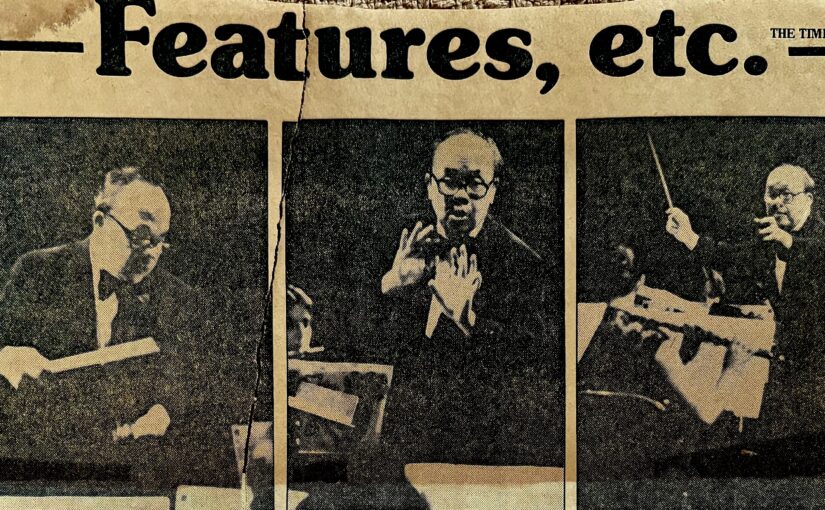“it’s all in the wrists”
by Alan Tepper (photos also by Alan Tepper)
Times-Leader, March 3, 1979.
His hands dart about with ballet-like grace, signaling not just the music’s tempo and volume, but also the emotion he wishes to relay to his audience.
During a performance, Rosendo Santos, conductor of the Wilkes College concert band, is often as dramatic as the music he directs. Working with intensity and elan, Santos cajoles and entreats his band to produce to their fullest.
During a recent concert at Wilkes’ Darte Center for the Performing Arts, Santos selected several pieces to be conducted without the use of his baton. With both hands free, Santos’ direction seems to take on a life of its own.
“For more expressive pieces, you need your fingers to bring out the feeling of the music. Conductors who must always rely on their batons are nothing but time beaters,” he says.
Santos, a native of the Philippines, assumed his role as conductor in October. His debut performance with the band followed two months later, a very successful Christmas concert. His second appearance, on February 26, was before a smaller but equally appreciative audience.
Santos, an assistant professor of music at Wilkes since 1968, calls the band a “really mixed group.” It joins members of the college student body and faculty with alumni, high school teachers and a few carefully selected high school students. “We truly represent a community effort,” he says.
The band’s first flautist, Linda Laden of Shohola, Pa., and a senior at the college, feels the conductor’s strongest suit is his rapport with the band members. “He always has time to talk with us and goes out of his way to be helpful,” she explains.
The conductor claims his band operates under relatively democratic rules. For example, for their last concert they were allowed to select the compositions which made up the latter part of the program.
His virtuosity extends from the podium to the classroom. During the current semester, Santos is teaching courses in elementary and advanced music theory, counterpoint, orchestration and applied music in percussion.
For Santos, music is not something confined only to the campus. His wife, Harriet, and their three sons frequently give concerts for church groups and meetings.
The boys, Erik, 11 years old, Nathan, 8, and Jason, 6, all perform on more than one instrument. Erik for instance, plays violin, piano, clarinet, and saxophone.
Mrs. Santos is an ordained Methodist minister and often fills in for clergy in the area while away from their congregations. Her musical talents are demonstrated with the Wyoming Valley Oratorio Society as a soloist, and with the B’nai Brith Choir in Kingston.
Private music lessons, for students of virtually any instrument, are also part of the busy schedule for Professor Santos. A parent of one of his students tells of songs Santos will compose for special occasions in his students’ lives.
Santos graduated from the University of the Philippines Conservatory of Music in 1950. His concentration of study was in composition and conducting. He received his masters degree in theory and composition from Catholic University in 1963.
He has served as a faculty member at the University of the Philippines, Catholic University, the West Virginia School of Music and Howard University. He has also served as conductor for the Philippines Symphony Orchestra and the Philippines Ballet Company.
In London as guest conductor of the Guildhall School of Music Symphony Orchestra, Santos conducted a royal performance for the Queen Mother.
Twice named composer of the year in Manila, in 1957 and 1958, Santos has written scores for several film companies in his native land and for the J. Arthur Rank studios in England.
When asked why he chose to pursue his career in the United States, Santos answers without hesitation. “I felt I had risen as far as I could at home,” he states. “I could share more and learn more here.”


